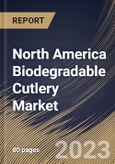Biodegradable cutlery is made by compressing or injecting natural fiber into resin, a polymer derived from renewable resources. Corn flour, bamboo, and sugarcane fiber, among other components, are generally used for creating these types of cutleries. Disposable, biodegradable cutlery serves as an environmentally conscious and sustainable substitute for plastic tableware. Natural biopolymers present notable benefits over plastic, such as biocompatibility, biological safety, and degradability, which are environmentally hazardous substances that persist in the environment. The growing prominence of the food and beverage sector has led to an increased need for this particular variety of cutlery in hotels, restaurants, and fast-food establishments on a large scale.
As environmental awareness rises and the amount of plastic waste generated by disposable cutlery increases, there is a growing demand for environmentally beneficial alternatives. "Green cutlery," which is biodegradable, is an exceptional method to reduce environmental impact and promote a more sustainable way of life. They are fashionable, well-liked, environmentally friendly, and a charming addition to any dining setting, regardless of the occasion. Their increased prominence is due to the fact that they are biodegradable and compostable, which means they decompose rapidly.
The entry of numerous startup companies from Canada and the United States is anticipated to bode well for the growth of the bio-based cutlery industry in North America. The increasing proportion of consumers constantly on the move is an additional noteworthy element that is anticipated to contribute to the expansion of this region. All of these factors have significantly contributed to expanding the market.
The US market dominated the North America Biodegradable Cutlery Market, By Country in 2022, and would continue to be a dominant market till 2030; thereby, achieving a market value of $13,836.8 Thousand by 2030. The Canada market is experiencing a CAGR of 8.8% during (2023 - 2030). Additionally, The Mexico market would exhibit a CAGR of 7.9% during (2023 - 2030).
Based on Raw Material, the market is segmented into Wood, Paper, Plastic, Husk, and Others. Based on countries, the market is segmented into U.S., Mexico, Canada, and Rest of North America.
The market research report covers the analysis of key stakeholders of the market. Key companies profiled in the report include Huhtamaki Oyj, Pactiv Evergeen Inc., Vegware Ltd. (Novolex), Biotrem, Biopak (Duni AB), Genpak, LLC (Great Pacific Enterprises, Inc.), TIPA Corp. Ltd., Ecoware, Better Earth LLC , Eco Guardian Inc.
Scope of the Study
Market Segments Covered in the Report:
By Raw Material (Volume, Thousand Units (Pack of 100), USD Thousand, 2019-2030)- Wood
- Paper
- Plastic
- Husk
- Others
- US
- Canada
- Mexico
- Rest of North America
Key Market Players
List of Companies Profiled in the Report:
- Huhtamaki Oyj
- Pactiv Evergeen Inc.
- Vegware Ltd. (Novolex)
- Biotrem
- Biopak (Duni AB)
- Genpak, LLC (Great Pacific Enterprises, Inc.)
- TIPA Corp. Ltd.
- Ecoware
- Better Earth LLC
- Eco Guardian Inc.
Unique Offerings
- Exhaustive coverage
- The highest number of Market tables and figures
- Subscription-based model available
- Guaranteed best price
- Assured post sales research support with 10% customization free
Table of Contents
Companies Mentioned
- Huhtamaki Oyj
- Pactiv Evergeen Inc.
- Vegware Ltd. (Novolex)
- Biotrem
- Biopak (Duni AB)
- Genpak, LLC (Great Pacific Enterprises, Inc.)
- TIPA Corp. Ltd.
- Ecoware
- Better Earth LLC
- Eco Guardian Inc.








